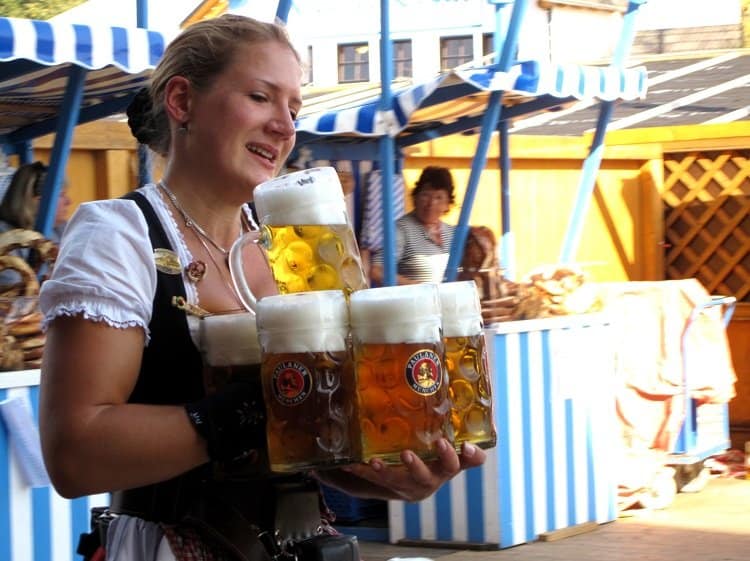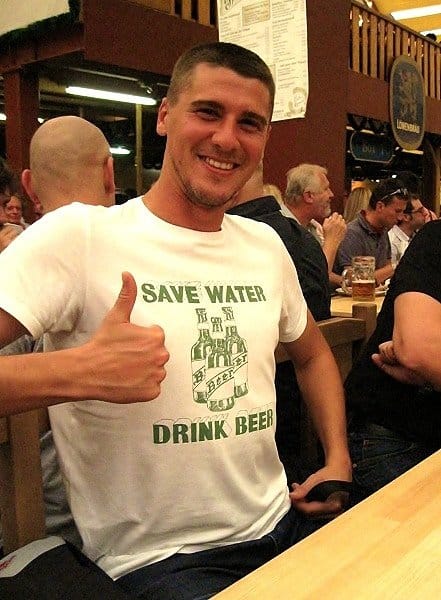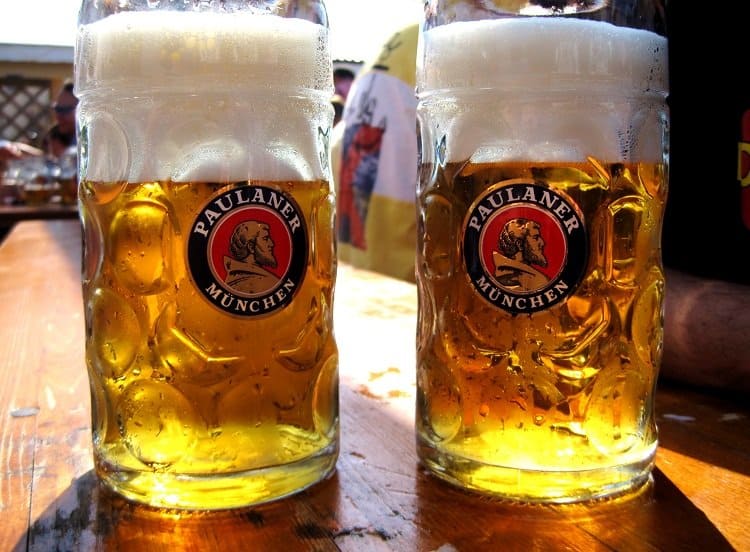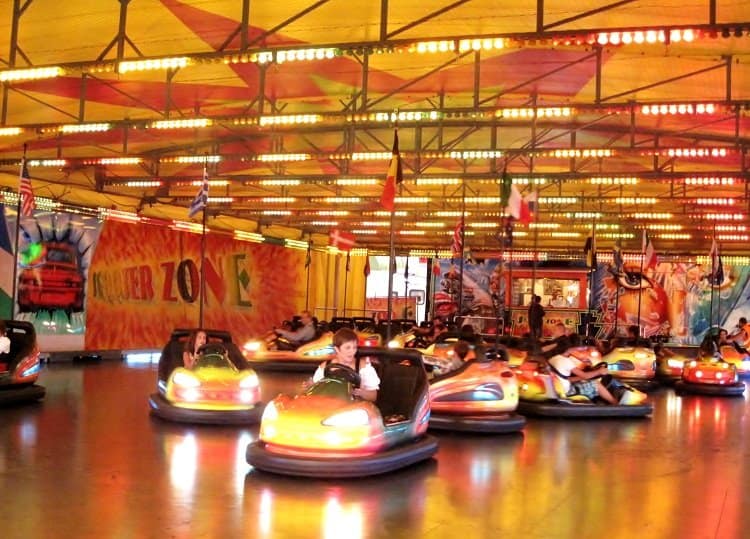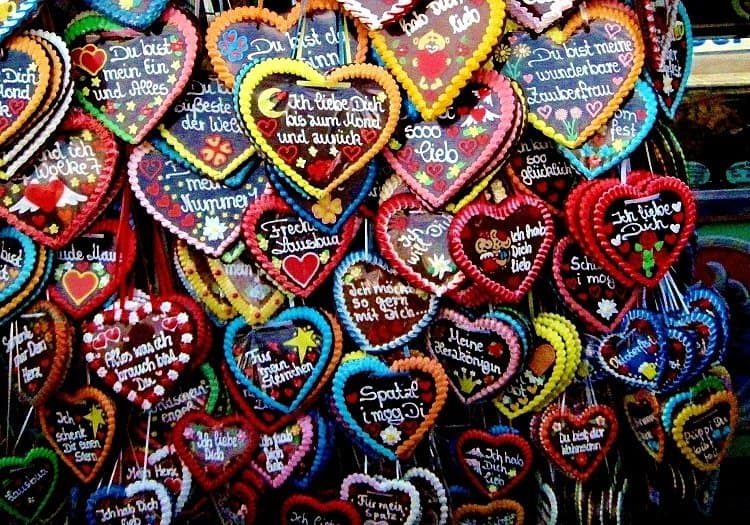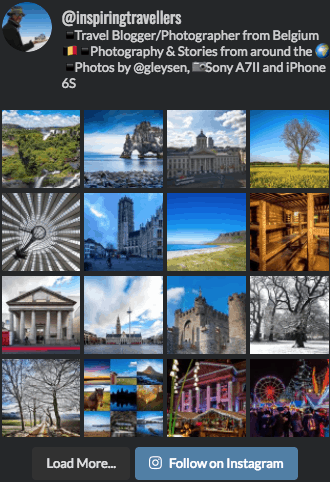Our first night at Oktoberfest was the best one – and I did it on one hour of sleep. I don’t know if they’re pumping oxygen into those halls or putting something extra special in the beer, but the sheer excitement and pulse of the crowds would get even the shyest wallflower up onto a bench, clonking her glass merrily and singing along with thousands of new best friends.
It was my first Oktoberfest and I learned quickly that all the grown-up fun is happening in the tents. Yes, the grounds boast some excellent (albeit expensive) carnival rides and enough beer food to soak up the litres, but if you want to hear Bavarian drinking songs and get amongst the unbeatable atmosphere, you have to find a seat.
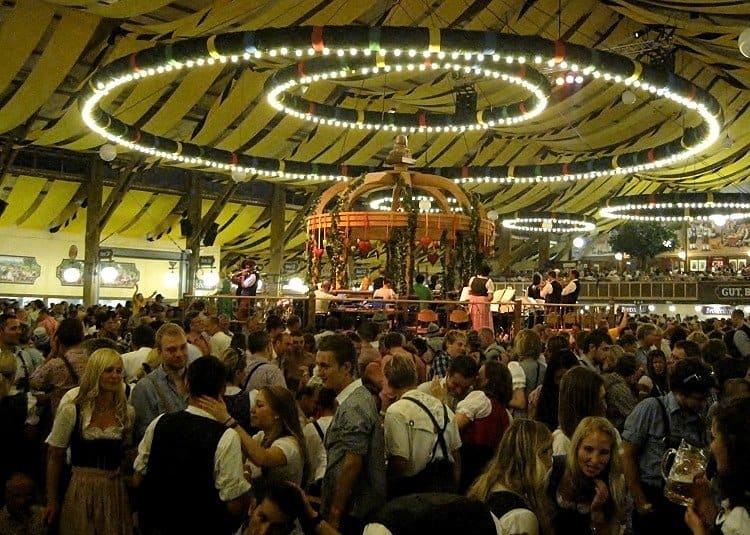
Saturday night at the beer tents – I really do think beer is the way to bring the world closer together!
This is the difficult part. Locals can book tables months in advance for groups of ten or more. Saturdays are impossible. This brings me back to our magical first Friday night where we found ourselves fresh off a train from Budapest, exhausted after an early start. I couldn’t sleep the night before from excitement but was determined to hit the tents in spite of this. It was late afternoon already and we looked at the crowds in front of each tent as we passed, finally drawn to Lowenbrau with its cheerful, stein-wielding lion rotating high above the crowds. After politely signalling to the doorman that we only had two, we slipped in past the more aggressive louts in matching outfits and began the search for a table.
No table means no beer. Most of them are reserved, even in the sections labelled “no reservations.” Our requests to join locals were politely declined but we finally found a mostly empty table with two women who signalled that we could sit down. Not long after we were joined by a group of Hungarian lads.
“Hey! You’re from Hungary? We just came from Hungary!” This is the basis for any strong friendship at Oktoberfest.
Not long after the German owners of the table came along. For the price of a round of drinks we were all allowed to stay. It doesn’t take too many mass (the proper name for the litre mugs of beer) to get you going – all the beer is around six per cent alcohol – and next thing I knew I was into the ritual. I love it all – the traditional music, the locals dressed in costume (Lederhosen for the guys, Dirndls for the ladies), the way everyone climbs onto the benches and dances. Mind you this was my first experience of Germany at all and I know the rest of the country isn’t like this. Still I think it was a fine introduction.
At some point I had to break the seal so I floated through the crowd to the unfathomably clean restrooms. I only remember having a giant smile on my face as I drifted, looking about me at the chaos and revelry, soaking up every particle of the happy atmosphere, which is unrivalled as John had warned me. I returned to our table to continue my conversations with our group and the people at two of the other tables next to us. At the end of the night I could barely write down our email addresses for everyone. There were hugs and cheers and we left with gingerbread cookies around our necks, which means somebody loved us. Finding our way home was a mission, but that’s another story.
Saturday was brutal. Not only were we hungover and faded but it was “Italian weekend,” which is exactly like it sounds. Italians come up to Germany for the festival and everything is extra crowded. It makes sense that Saturdays are the busiest because it’s the best day for the locals to enjoy their traditions. Every tent had massive crowds and wait times. We had lucky timing to enter the Paulaner beer garden when they were letting a huge wave of people through, but the line to get into the actual tent was an hour deep. We left after one drink and headed to the Schottenhamel, which was a silly move. We waited an hour before finding out that we weren’t even in the entrance queue. The atmosphere in the crowd was entertaining, watching the drunk people stumble out of the tent and all the interesting characters. Jokes were cracked, one drunk Swedish guy tried to lie his way past the guards and even the guards were fun to watch, the way they stalked across the barrier tape sizing us up, taunting us. But that’s not what one comes to Oktoberfest to see. So we befriended two New Zealand brothers who took us to the Paulaner Weissbier garden – a place to go when you can’t get a beer anywhere else.
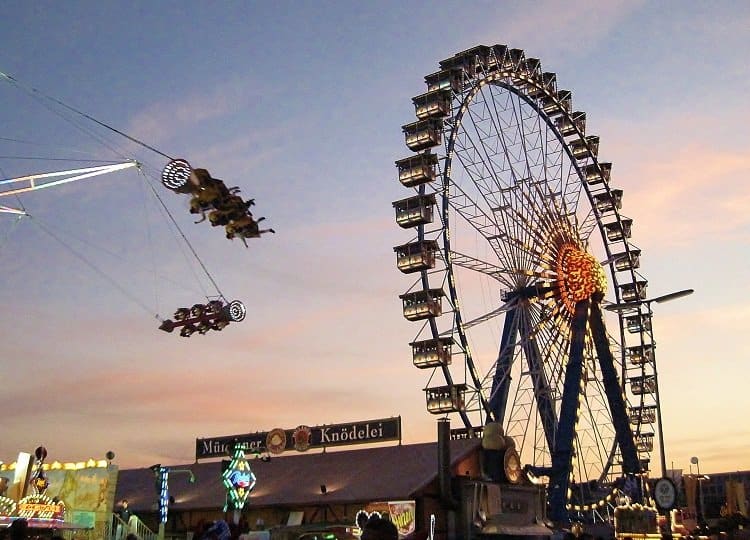
That ride on the left spins you upside down as it goes around – perhaps not the best ride for a drinking festival?
Later that night we got back into a tent, a feat that was only accomplished because a) one of the brothers was dressed in the lederhosen and a hat and really looked like a model German boy, b) the other brother had some great tattoos and was able to bond over this with the doorman, and c) somehow my smile and the only German word I know (dankeschön) amused the doorman when said German-looking boy didn’t speak a lick of German. It was already 9.30pm but we were able to find a table quickly and enjoy the final hour of the night.
The next two days were relatively uneventful. Weekdays are so quiet during the day that it hardly feels like Europe’s largest beer festival. Except, of course, at the foreigner-filled Hofbrauhaus. We made sure to visit all the tents we were curious about and try most of the beers on offer. By Monday evening, when everything picked up again and felt festive and merry, we were over it. I was sad to leave behind the singing masses but I think a couple of thirty-somethings can only last so long. We were amazed at how some of the local elders can handle it all – but they are out in force. The only advice I have to offer about Oktoberfest is to just get there! It truly was the biggest, most wonderful international party I’ve ever had the pleasure to join.
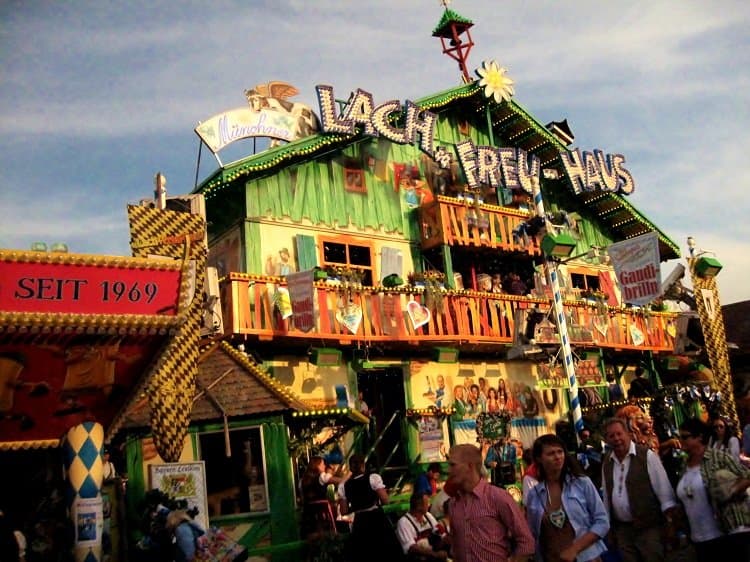
Helpful Hints:
1. Book accommodation well in advance; the best hotels and hostels will sell out months before the festival.
2. Come early if you don’t want to line up, especially on the weekend, where early means 10am. Even then, good luck getting a table and holding it for the day as all the locals book months in advance. Groups of 10 or more can try to get a reservation, but do this in February or May (different tents start taking bookings at different times).
3. Eat regularly in order to savour the memories, particularly the half chickens on offer.
Fast Facts:
1. According to Discover Munich, about 5.5 million litres of beer is served each year at the event (though I read elsewhere that the 2010 figure was around 7 million).
2. The alcohol content of the beer ranges from 5.8% to 6.3%.
3. A mass of beer costs around €9, but handing over a €10 note and not asking for change means your next beer will be easier to get.
4. The taste of the beer varies greatly from tent to tent, but they are always served cold and the undoubted quality is there with every sip.
Have you been to Oktoberfest? How did you cope?
You may also enjoy these similar posts:
- 62shares
- Share on Facebook
- Pinterest13
- Tumblr
- Evernote
